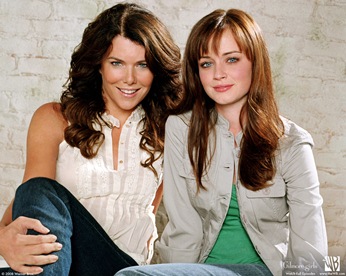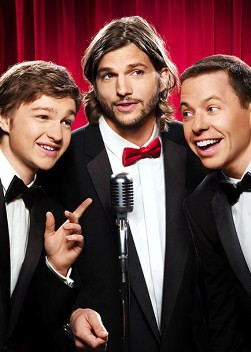In talking with a friend about the state of TV sitcoms, he said something brilliant: "Sitcoms are not variety show skits."
Or as Buster Keaton once relayed to Lucille Ball, "You have to play comedy, dead straight. You have to believe that your 'nose is on fire'" (which was a reference to the classic I Love Lucy episode, titled, L.A.At Last, in which Ball's Lucy Ricardo accidentally set her snout a flame).
In other words, for a sitcom to be funny, it has to be based in reality.
With regard to the contemporary situation comedy, there's not an ounce of reality in any of them, with the few exceptions maybe, possibly being ABC's double-threat on Wednesday nights, The Middle and Emmy champ Modern Family.
Yet, even those shows have their comedic flaws.
Does EVERY character on EVERY sitcom have to be snarky, cartoonish or say things that nobody would say in real life - every five seconds - just to get a laugh?
Ultimately I blame Gilmore Girls, which aired a few years back on the WB. In my book, these Girls ignited the manic unrealistic dialogue that is infesting today's sitcoms. All that chipper-dense chatter then let loose by the likes on-screen mother and daughter team Lauren Graham and Alexis Bledel was just plain exhausting.
ignited the manic unrealistic dialogue that is infesting today's sitcoms. All that chipper-dense chatter then let loose by the likes on-screen mother and daughter team Lauren Graham and Alexis Bledel was just plain exhausting.
Notably, Bridesmaid actress Melissa McCarthy was a featured supporting regular on Girls, and she partook in the manic play as well. Today she's the newly-crowned Emmy-winning star of her own hit sitcom Mike and Molly, airing on CBS, Monday nights, and produced by Chuck Lorre – all of which brings us to a more recent example of such comedic assault.
No one talks to each other like the characters did during the most anticipated premiere of the new season:
Monday night's telecast of one of Lorre's other sitcom hits: the veteran Two and A Half Men, which had Ashton Kutcher replacing Charlie Sheen on the unstoppable series that is now in its ninth year.
As was explained in what essentially became a "pilot" episode for a new edition of the show, Sheen's character, Charlie Harper, has died. Kutcher's Walden Schmidt, described in an early press release as "an internet billionaire with a broken heart," becomes the second "man" of the household, joining Charlie's brother Alan Harper (played by Jon Cryer), and nephew Jake Harper (son to Alan, played by Angus T. Jones).
Sheen's character, Charlie Harper, has died. Kutcher's Walden Schmidt, described in an early press release as "an internet billionaire with a broken heart," becomes the second "man" of the household, joining Charlie's brother Alan Harper (played by Jon Cryer), and nephew Jake Harper (son to Alan, played by Angus T. Jones).
That's all fine and good, and by the time this blog is posted, the legal entanglements surrounding Sheen's departure from the show may have been happily resolved (allegedly to the tune of millions).
So, Sheen's happy. Show proprietors Warner Bros. (which also gave us Gilmore Girls by the way) and CBS are happy. Kutcher is happy. The entire cast and crew of Two are happy. Producer Chuck Lorre is happy. And clearly, the audience is happy, as an astounding 28 million viewers tuned in for Monday's debut episode.
Yet with regard to that premiere, which opened with Harper's bizarre funeral, I'm still kind of scratching my head. As it was relayed, many of his ex-girlfriends, including Courtney (Jenny McCarthy) showed up at the service to…uhm…pay their respects. In doing so, they spewed some of the most mean-spirited, vulgar verbal attacks ever heard on and possibly off the air.
I realize the behind-the-scenes controversy surrounding the re-working of the show became larger than life. I also realize it would be hard not to address the issues at hand at least in some way, edgy or otherwise.
But THAT edgy and THAT "otherwise"?
Forget that, in general, many real-life people would never show up at the same time and say such horrible things about someone who was deceased, no matter how evil that person may or may not have been. Or that a mother, no matter how distant from or cold toward her son she was, as with the relationship between Holland Taylor's Evelyn Harper and Charlie, she would never stand up at her off-spring's funeral, in tears, and promote her business.
Forget all that.
The real issue is: the dialogue wasn't funny, mostly because again, it wasn't based or presented in reality.
Which brings us back to the whole "nose on fire" thing.
If it ever is written in some future Men script that says, Walden Schmidt's nose is set on fire, hopefully, he will display a sincere and demonstrative fear about such a development. Within the context of sitcom-land, it would hopefully be a funny scene (as it was on I Love Lucy, when her schnoz-blazing actually had the potential to be painful).
Unfortunately, if such a scene were ever composed for Men, it's more likely that Kutcher would either choose or be directed to say the line in some acerbic manner, like, "Oh, yeah, look, man. My nose is on fire." From there, he may then just potentially go knock boots with some hot babe or something.
The point is: Sitcoms are not variety show skits, just like my friend said. They are not mere singular scenes. They are an extended arc of scenes that are intended to tell a story with consistent and distinguishing character development along the way, whether in the premise of one episode, or over time, throughout the season.
Also, too, sitcoms should not be tailored more in production, than in performance. That is to say, rapid camera movements and manic flashbacks to back-up speedy present dialogue are all aspects of today's TV sitcoms that are manufactured in post-production (as with shows like NBC's 30 Rock or Fox's new New Girl, starring Zooey Deschanel).
Conversely, a few classic sitcoms are not without their flaws either. In the latter years of Happy
Today's sitcom actors, in general - not all, but in general - no longer tape in front of a live audience, and mostly now play to only the cameras.
How about if sitcom actors, in single-camera shows or even those taped before a live audience, actually just stay in character and play to and relate with the other actors portraying the other characters in their given shows?
How about the writers creating words and scenarios based on reality settings that develop and have to do with the actual characters that they have created?
How about just making sitcoms based on real-life situations and allow the comedy to come from those situations?
Like they did on The Mary Tyler Moore Show or The Dick Van Dyke Show.
That isn't to say that many of the episodes of either Moore or Van Dyke were not sometimes silly or sometimes not based totally in reality. But how the characters RESPONDED to those situations were always real and believable. Each of the characters, like Rose Marie's Sally Rogers on Van Dyke or Ed Asner's Lou Grant on Moore, had their own definitions. One never sounded like the other. None of the characters chirped out words that any other character would say. Each character's words were their own.
Even as when Mary Tyler Moore played Laura Petrie on Van Dyke and later Mary Richards on her Moore show. She played two different characters in two different ways, and neither sounded like any other character that she may have or may not have been playing against in either series. Mary Richards never sounded like Valerie Harper's Rhoda (who could easily be defined as snarky indeed) or Betty White's Sue Ann Nivens (who was snippy and horny). Laura Petrie never sounded like Marie's Sally Rogers or Laura's needy next door neighbor, Millie Helper (played by Ann Morgan Guilbert).
In today's sitcom world, the dialogue between characters is interchangeable. It's all the same. Again, snarky, snippy, and mean-spirited.
And the biggest sin of all?
None of it is based in or on truth or is really that funny.
That said…I have to go.
My nose is on fire.
And it HURTS!
Herbie J Pilato is a Writer/Producer who has worked for Syfy, A&E, TLC, Bravo, The Discovery Channel, Universal, Warner Bros. and Sony. Herbie J is the author of a number of acclaimed TV tie-in books (TheBionicBook, Life Story - The Book of Life Goes On, TheBewitchedBook, Bewitched Forever, TheKung FuBook of Caine, TheKung FuBook of Wisdom, and NBC & ME: My Life As A Page In A Book). In 2010, Herbie J founded The Classic TV Preservation Society (a nonprofit organization dedicated to closing the gap between positive TV shows and education), and presently serves as Creative Director for Erie Street Entertainment (a TV production company that is geared toward sci-fi/fantasy, and family-oriented material). For more information, please log on towww.ClassicTVPS.blogspot.comorwww.ErieStreetEntertainment.blogspot.com, or contact Herbie J directly viahjpilato@yahoo.com.
Read all Herbie J's MediaBizBloggers commentaries at Herbie J's Classic TV Corner.
Check us out on Facebook at MediaBizBloggers.com